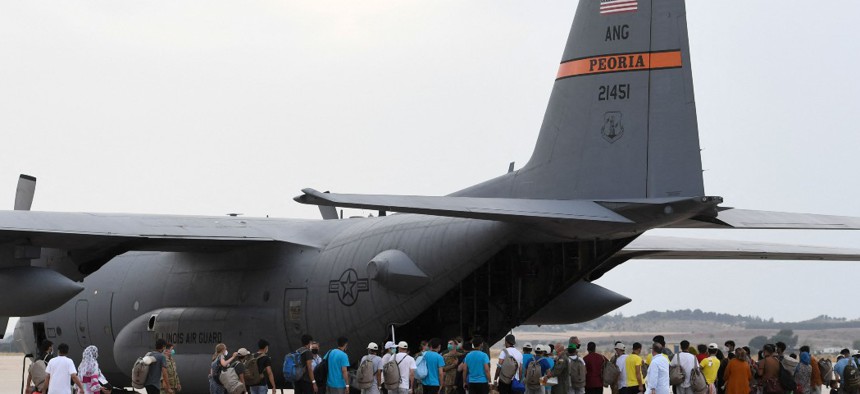U.S. May Have Allowed 'Known or Suspected Terrorists' to Go Undetected Among Resettled Afghan Evacuees

Refugees board a US aircraft heading to Germany, after being evacuated from Kabul during an evacuation flight, at the Torrejon de Ardoz air base, 30 km from Madrid, on August 24, 2021. PIERRE-PHILIPPE MARCOU/AFP via Getty Images
Missing Afghan evacuees could pose a national security threat, according to an audit.
National security threats may emerge because agencies failed to use all of the Defense Department’s available biometric and contextual data to properly vet Afghan evacuees who resettled in America amid the chaotic withdrawal last year, according to a new watchdog report.
“As of November 2, 2021, [National Ground Intelligence Center] personnel had identified 50 Afghan personnel in the United States with information in DOD records that would indicate potentially significant security concerns,” officials from the Pentagon’s inspector general office wrote. In a footnote, they clarified such concerns include individuals “whose latent fingerprints have been found on improvised explosive devices and known or suspected terrorists and for which the NGIC sends derogatory information notifications to appropriate DOD personnel.”
This report—called an Evaluation of the Screening of Displaced Persons from Afghanistan—offers hard numbers and new details about interagency processes in the aftermath of the U.S. exit. It was conducted to determine the extent to which Pentagon entities managed and tracked displaced persons from Afghanistan through biometric enrollment, screening and vetting efforts.
“The DOD OIG announced the project in September of 2021, and published the report last week,” a spokesperson for the office told Nextgov on Tuesday.
Last summer, President Joe Biden initiated an interagency initiative “to evacuate and relocate Afghans who had applied for a Special Immigrant Visa (SIV) along with other vulnerable Afghans to address the rapid takeover of Afghan cities by the Taliban,” officials noted in the review. Evacuees from there were sent to “safe havens,” or temporary locations like military bases, to complete their immigration processes.
OIG members performed site visits or conducted interviews with personnel at five of the eight DOD installations offering temporary housing for involved evacuees, among others, for this evaluation.
“Afghan evacuees were not vetted by the [National Counter-Terrorism Center, or NCTC] using all DOD data prior to arriving in [the continental U.S.],” officials wrote of their findings.
This issue occurred because “Customs and Border Patrol enrollments were compared against the Department of Homeland Security Automated Biometric Identification System or IDENT data, which did not initially include all biometric data located in the DOD Automated Biometric Identification System or ABIS database”—and because the DOD’s NGIC has agreements with foreign partners that prohibit the sharing of some ABIS data with non-DOD agencies.
NGIC moved to expand its analytic review of all biometric watchlist matches, “to include non‑watchlist matches of Afghan evacuees.” To do so, this DOD center had to enter into an agreement with DHS to access CBP records to complete the review, which it did in September. That agreement was set to expire in December—but based on a recommendation from the OIG, was extended to June of this year.
“As of December 13, 2021, NGIC personnel have reviewed approximately 58,455 of the 80,404 Afghan evacuee identities received and have assessed that it will take until approximately March 2022 to finish this analytic review,” officials wrote.
Through that review, they have identified dozens of Afghans “with derogatory information” that justifies “unfavorable fitness” from the DOD ABIS database, who were already operating in the U.S. This is partly because, again, some were not properly screened before entering the states.
Further, Afghan parolees generally retain the right to leave safe havens they’re placed in at any time after receiving the required vaccinations and tuberculosis testing, the report confirms. Amid the review, officials also determined that DOD staff “could not locate some Afghan evacuees whom NGIC personnel identified as having derogatory information that would make them ineligible for” a program at the safe havens.
“[A]s of September 17, 2021, the NGIC had identified 31 Afghans in CONUS who had derogatory information. Of those 31, only 3 could be located,” officials wrote. They went on to add that “not being able to locate Afghan evacuees with derogatory information quickly and accurately could pose a security risk to the United States.”
Based on its assessment, the OIG ultimately recommended that the Defense Under Secretary for Intelligence and Security produce fresh procedures regarding information-sharing associated with Afghan evacuees for Pentagon and interagency stakeholders.
This report caught at least one lawmaker’s attention.
“Congress should not even begin to consider proposals related to sweeping immigration status changes for evacuees, such as an Afghan Adjustment Act, until the Biden administration, at the very least, guarantees the integrity of and fully responds to long-standing congressional oversight requests regarding the vetting and evacuee resettlement process,” Sen. Chuck Grassley, R-Iowa, wrote in a statement responding to it.






